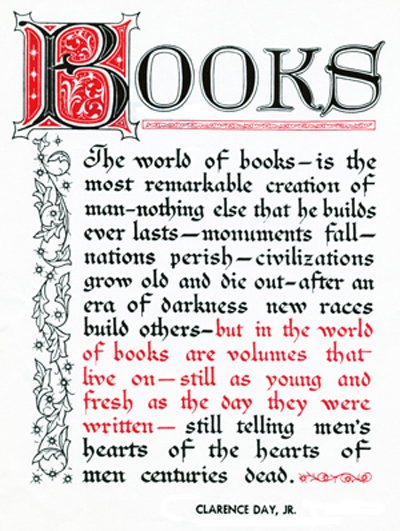biblio-, bibli-, bibl-, biblico-
(Greek: book, books)

2. An unrivaled reference book or guidebook.
3. When not capitalized, it refers to a book that is looked upon as authoritative or as a preeminent work of literature.
4. A collection of writings or a library of books.
2. A book containing the sacred writings of any religion.
"I can read anything which I call a book", wrote Charles Lamb. "There are things in that shape which I cannot allow for such. In this catalogue of books which are not books—biblia a-biblia—I reckon Court (Royal) Calendars, Directories, Pocket Books, Draught Boards, bound and lettered on the back, Scientific Treatises, Almanacs, Statutes at Large, the works of Hume, Gibbon, Robertson, Beattie, Soame Jenyns, and generally, all those volumes which, 'no gentleman's library should be without.' "
Also, above and below the Biblia Paupera were pictures of prophets and on each side were scenes from the Old Testament, all of which resulted in a concordance of the Old and the New Testament events in human salvation.
The Biblia Pauperum was one of the first books printed by block printing (a single woodcut for each page) and the simpler versions were probably used by the clergy as teaching aids for those who could not read, which included most of the populations.
2. Learning or literature relating to the Bible.
3. Having a particular regard for the Bible as the Word of God and the ultimate authority for religious beliefs and morality.
2. Someone who adheres to the letter of the Bible; specifically, one of the medieval doctors (sometimes called Biblical doctors) who demonstrated religious truths primarily by means of the Bible.

The biblio- element has many well-known applications in the English language; however, there are probably several new words that you could add to your vocabulary.
A Bibliography is one asset to knowing where much of the information for this dictionary comes from.
This is probably just one example of a bibliokleptomaniac exceeding his desire to "protect" neglected books. A true story that appeared in newspapers in May, 2002 and June, 2003 regarding a teacher who found a secret entrance to an old eighth-century monastery in Alsace, France; with illustrations that show how this teacher performed his "book rescues".
"I'm afraid my burning passion overrode my conscience. It may appear selfish, but I felt the books had been abandoned. They were covered with dust and pigeon droppings and I felt no one consulted them anymore," said the borrower of the books.
2. Anyone who gets "drunk on books" or who reads too much; excessive reading.
There are people who read too much: The bibliobibuli. I know some who are constantly drunk on books, as other men are drunk on whiskey or religion.
They wander through this most diverting and stimulating of worlds in a haze, seeing nothing and hearing nothing.
In modern times, other forms of media; such as, phonograph records, video tapes, and CDs have also been ceremoniously burned, torched, or shredded in biblioclasms. The practice is usually carried out in public, and is generally motivated by moral, religious, or political objections to the materials.
Related book unit: libr-.

